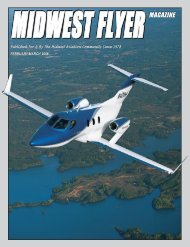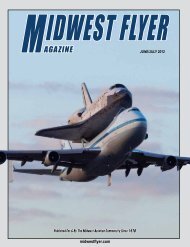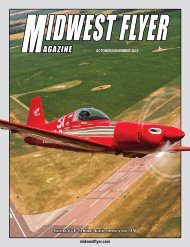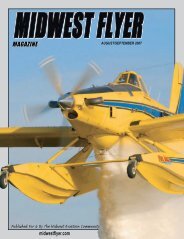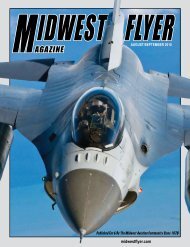minnesota - Midwest Flyer
minnesota - Midwest Flyer
minnesota - Midwest Flyer
You also want an ePaper? Increase the reach of your titles
YUMPU automatically turns print PDFs into web optimized ePapers that Google loves.
Wisconsin Bureau of Aeronautics<br />
David M. Greene, Director<br />
P.O. Box 7914, Madison, WI 53707-7914 (608) 266-3351<br />
Flight Service Station<br />
Evolution Continues<br />
by Jeff Taylor<br />
WisDOT Aviation Consultant<br />
Since the<br />
1920s, pilots<br />
have relied<br />
on Flight Service<br />
Stations (FSS) for<br />
timely weather<br />
reports, and other<br />
critical flight safety<br />
information. As<br />
technology has<br />
Jeff Taylor<br />
changed, so has FSS. What began as a<br />
system of Air Mail Radio Stations<br />
(visit www.atchistory.org for more<br />
FSS history), has evolved into a vast<br />
communication network using the<br />
telephone, air-band radio and the<br />
Internet. Another step in the evolution<br />
of the FSS system occurred in<br />
February 2005 when the FAA awarded<br />
Lockheed Martin a contract to<br />
operate the FSS system.<br />
With a long-term contract,<br />
Lockheed Martin plans to install new<br />
technology and upgrade facilities to<br />
improve the efficiency of Flight<br />
Service Stations while maintaining<br />
the safety of the aviation system. The<br />
new technology includes networked<br />
flight support systems that will<br />
streamline flight planning and allow<br />
the sharing of weather and air space<br />
system status across the entire<br />
Automated Flight Service Station<br />
(AFSS) network. The new data systems<br />
will also integrate communications<br />
and search and rescue services<br />
within the AFSS network.<br />
36 MIDWEST FLYER MAGAZINE OCTOBER/NOVEMBER 2007<br />
www.dot.wisconsin.gov<br />
(TOP) The operations area at FS21, Ft. Worth, Texas.<br />
(BOTTOM) Lockheed Martin Flight Service Station, Ft. Worth, Texas.<br />
One of the first differences you’ll<br />
notice is when you call 1-800-WX-<br />
BRIEF, you’ll hear, “Welcome to<br />
Lockheed Flight Services.” This<br />
change has many pilots asking, “Does<br />
this change how I get my pre-flight<br />
weather briefing?” or “Who will<br />
answer when I call Green Bay radio<br />
from the air?” It’s important to understand<br />
the new features and those that<br />
stay the same so you can make the<br />
most of the new system.<br />
Let’s begin with how the structure<br />
of FSS has changed.<br />
In April of this year, the Green<br />
Bay AFSS closed along with many<br />
other stations across the country.<br />
Three major stations or hubs have<br />
been established with several satellite<br />
stations serving as support for the<br />
hubs. The Washington, D.C. hub<br />
serves the eastern region, including<br />
Wisconsin. Another hub, in Fort<br />
Worth, Texas, serves the central<br />
region and the third hub located in<br />
CONTINUED ON PAGE 39



